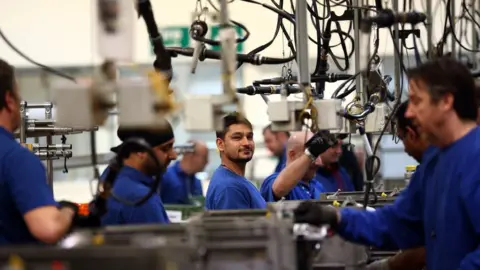UK firms see boost as uncertainty eases, survey says
 Getty Images
Getty ImagesUK manufacturing and services saw their best month for more than a year in January, a survey has suggested.
The UK composite purchasing managers' index (PMI), which includes the two sectors. rose to a 16-month high of 52.4, up from 49.3 in December.
IHS Markit, which compiled the survey, said demand was growing in the wake of the general election in December.
The figures are the last economic data to be released before Bank of England policymakers meet next week.
Analysts said they made an interest rate cut less likely.
The IHS Markit/CIPS PMI for services showed the sector returning to growth for the first time since August 2019, rising to 52.9 from the previous month's 50.0. Any score above 50 indicates expansion.
Manufacturing continued to contract, but at a slower pace. Its PMI reading rose to 49.8 from December's 47.5.
Uncertainty easing
"The survey data indicate an encouraging start to 2020 for the UK economy. Output grew at the fastest rate for 16 months amid rising demand for both manufacturing and services, suggesting business is rebounding after declines seen late last year," said IHS Markit's chief economist Chris Williamson.
"Intensifying political and economic uncertainty ahead of the general election has started to ease, encouraging more spending and helping push business expectations of future growth to its highest since mid-2015."
Paul Dales, chief UK economist at Capital Economics, said: "The large rebound in January's flash activity PMIs will probably be enough to prevent the Monetary Policy Committee from cutting interest rates at next Thursday's meeting.
"After all, it's the surest sign yet that the economy has turned a corner since the election. We think the next move in interest rates may actually be up, albeit not until 2021."
The EY Item club said the survey "indicates that the economy has gained significant initial benefit from reduced uncertainties following December's decisive election result".
However, its chief economic adviser, Howard Archer, warned: "It must be considered that the purchasing managers' surveys can tend to overstate developments at times of significant changing political circumstances, so the flash survey could possibly exaggerate the rebound in January after overplaying some of the earlier weakness."
